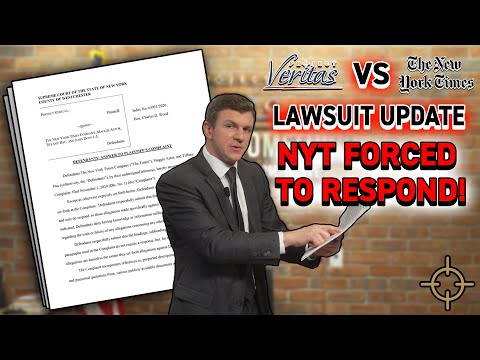
NEW YORK, NY – James O’Keefe, the founder of Project Veritas, gave an update to the undercover sting organization’s ongoing defamation lawsuit against the New York Times after the newspaper submitted written responses to the allegations that O’Keefe described as “a doozy.”
The lawsuit stems from several articles written for the Times by reporters Maggie Astor and Tiffany Hsu that were highly critical of Project Veritas’ coverage of alleged voter fraud in the congressional district of Rep. Ilhan Omar (D-MN) last fall.
Over the course of their coverage of Project Veritas, Astor and Hsu referred to the organization’s reporting as “deceptive,” “false,” and being reported “with no verifiable evidence.”
As part of their response to O’Keefe’s lawsuit, the New York Times was forced to admit that Astor and Hsu did not reach out to verify the sources that Project Veritas had cited in their report.
“The New York Times- all you have to do is pick up the phone and call him… but you didn’t do that!” O’Keefe said. “And maybe you didn’t do it because if you did do it, you’d have to publish that it was real! But what you put in your A-section news article, you said that we were quote ‘making claims without evidence.’ You didn’t even pick up the phone to make a damn phone call! And you call yourselves journalists! The only people that the New York Times reached out to were those people who supported the narrative that they wanted to tell.”
The Times also neglected to answer other allegations in the lawsuit due to a “lack knowledge or information” about specific claims, O’Keefe said.

“They feigned ignorance no fewer than 40 times in their answer claiming they ‘lack knowledge [or] information,'” he said.
In a previous attempt to have the defamation lawsuit dismissed, The Times initially fell back on the assertion that reporter Maggie Astor was essentially an “opinion writer,” a claim that they have now admitted is not the case.
In his decision to reject The Times’ motion to dismiss the suit, New York Supreme Court Justice Charles Wood noted that Project Veritas had shown adequate evidence that the New York news outlet had possibly been motivated by “actual malice” and acted with “reckless disregard” in regards to Astor and Hsu’s articles.
O’Keefe noted that The Times has requested a jury trial as the lawsuit heads into its discovery phase, and warned Times Executive Editor Dean Baquet that that is exactly what he wants as well.
“And you better prepare for a jury trial, my friend, because there is no amount of money that you can give me to make me settle,” O’Keefe said. “You ought to be ashamed of yourself. You’re lucky there aren’t thousands of more people suing you for defamation for what you’ve done.”
Project Veritas has also filed defamation lawsuits against Twitter and CNN.




Comments are closed.